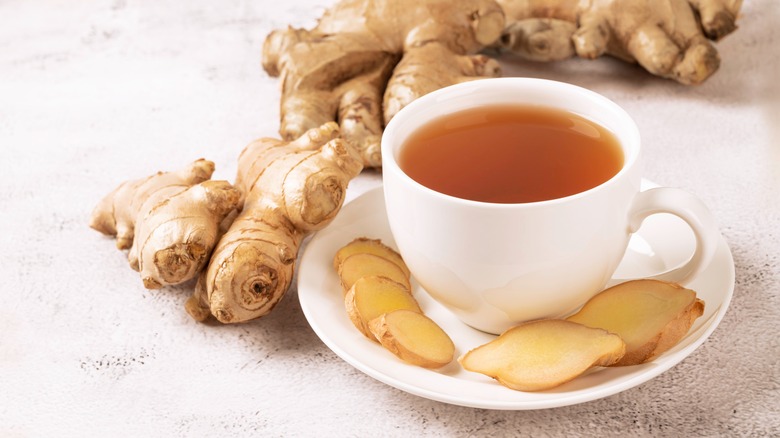Can Ginger Help Reduce Hangover Symptoms?
A big night of drinking may be fun at the time, but the hangover the next morning might have you swearing off alcohol for good. Hangovers are caused by several changes that happen in the body after drinking too much alcohol, according to Mayo Clinic. Hangover headaches, nausea, dizziness, and other symptoms are caused by the dehydration, inflammation, and low blood sugar that often follow binge drinking.
The surest way to avoid a hangover is to abstain from consuming alcohol in the first place. But for those who do decide to drink, certain factors might make some people more likely than others to feel ill the morning after. For example, drinking on an empty stomach is more likely to trigger hangover symptoms than consuming alcohol with food. Healthline also notes that women, younger people, and people with certain genetic variations are more likely to experience severe hangovers.
If you feel hungover after having a few too many cocktails or glasses of wine, the first thing you should do is rehydrate, says Amanda Beaver, wellness dietitian at Houston Methodist Hospital. She also recommends replenishing the body with easy-to-digest carbs, a smoothie, eggs, and vitamin C.
However, if nausea and vomiting are making it hard to keep food down, ginger might be the answer.
Ginger may benefit your stomach, liver, and heart after drinking
A bad hangover can make any food or drink sound unappealing, especially if you're feeling queasy. However, consuming a little ginger might be enough to cure hangover nausea. According to Medical News Today, multiple studies suggest that the natural root reduces nausea and vomiting and improves digestion. Registered dietitian nutritionist Jim White told Daily Burn that sipping ginger tea the morning after drinking is an effective way to settle an upset stomach.
As a bonus, ginger may also reduce inflammation, a cause of many hangover symptoms, according to the National Institute on Alcohol Abuse and Alcoholism.
Even after hangover symptoms have subsided, studies show that ginger continues to protect the body from alcohol-related damage. A 2015 study published in the Journal of Extracellular Vesicles found that nanoparticles in ginger protect the liver from alcohol-induced damage. Another 2017 study published in Pharmacognosy Magazine concluded that ginger treatment limits alcohol damage to the heart.
Ginger tea, using fresh ginger steeped in hot water, is one way to take advantage of the natural ingredient's health effects. Depending on what you can stomach, other options also include supplement capsules, powders, pickles, and candies (per Healthline).


